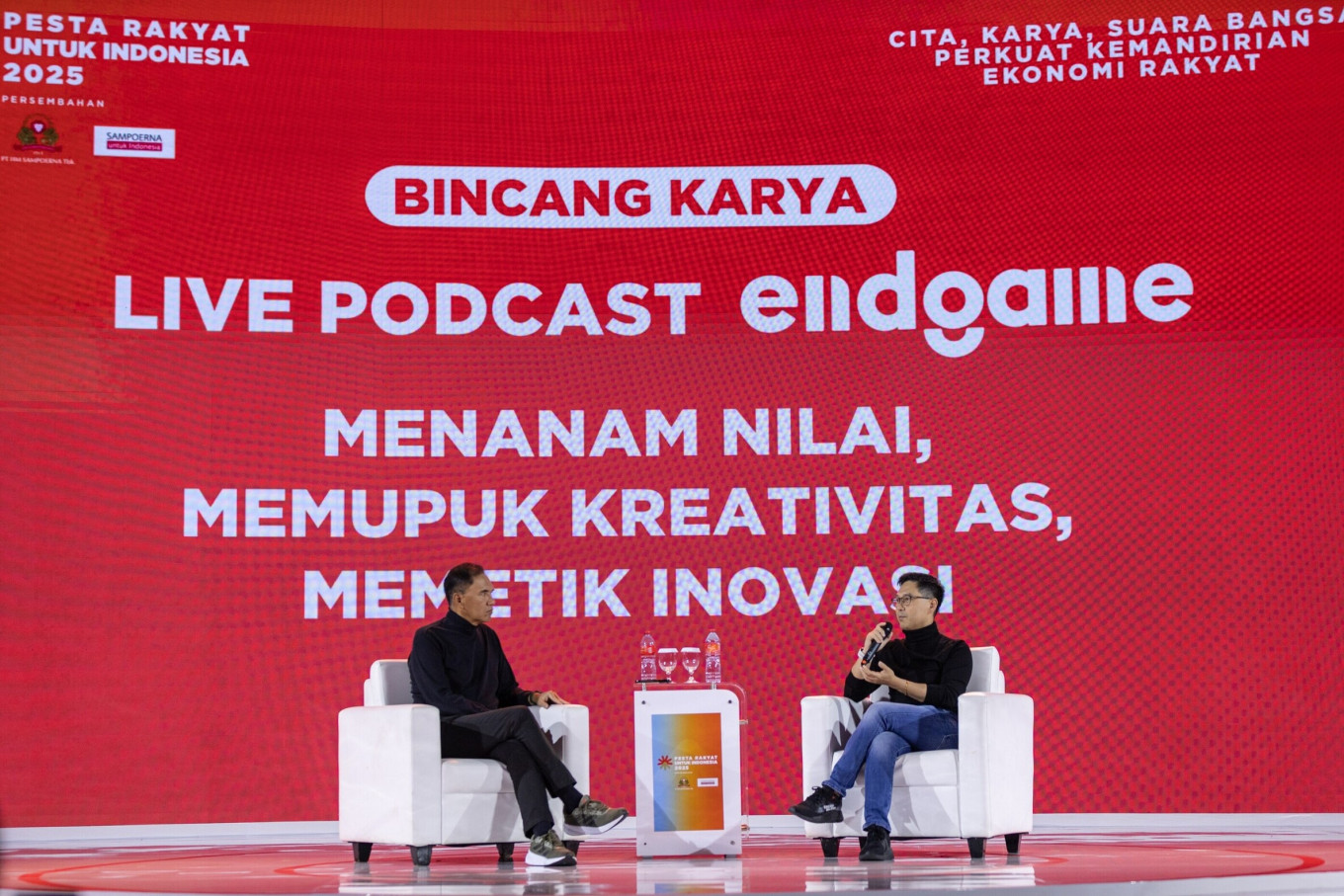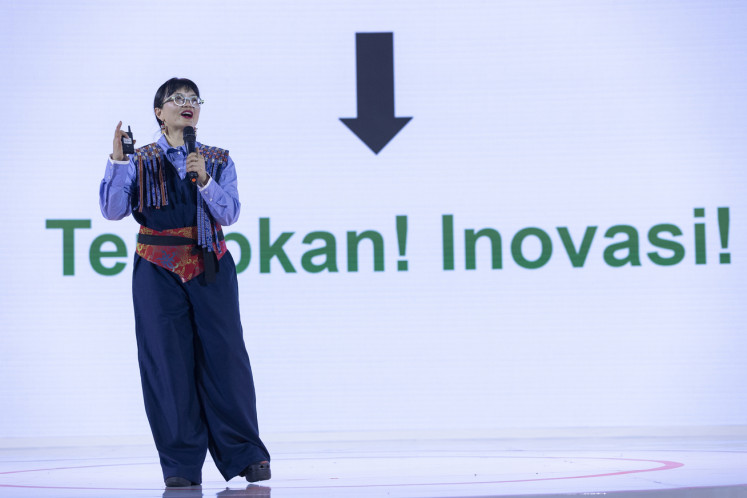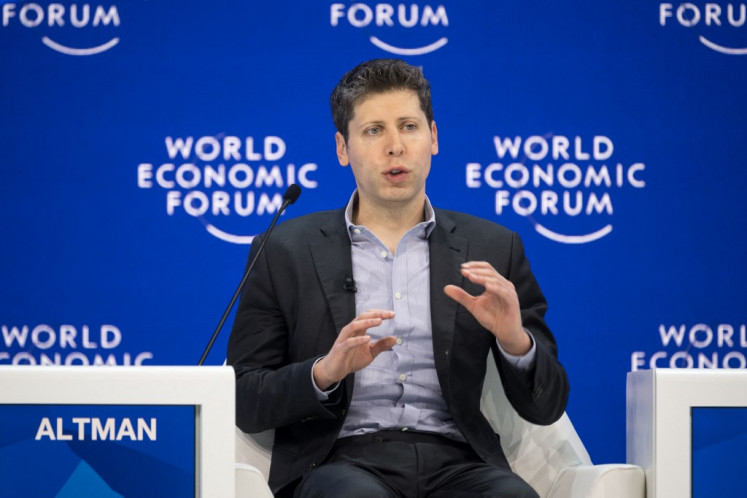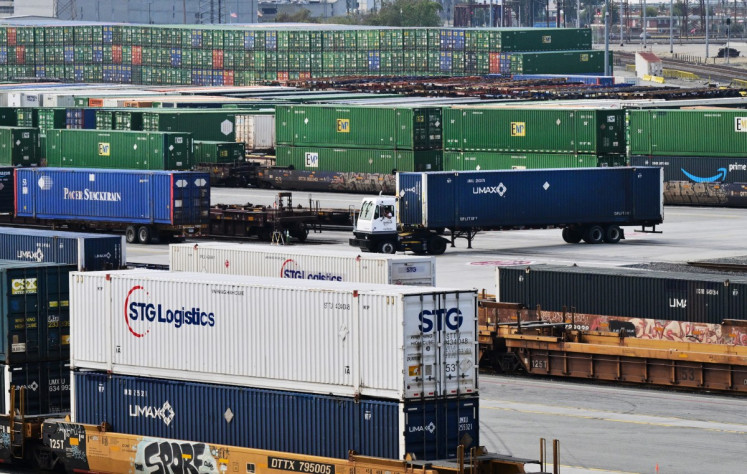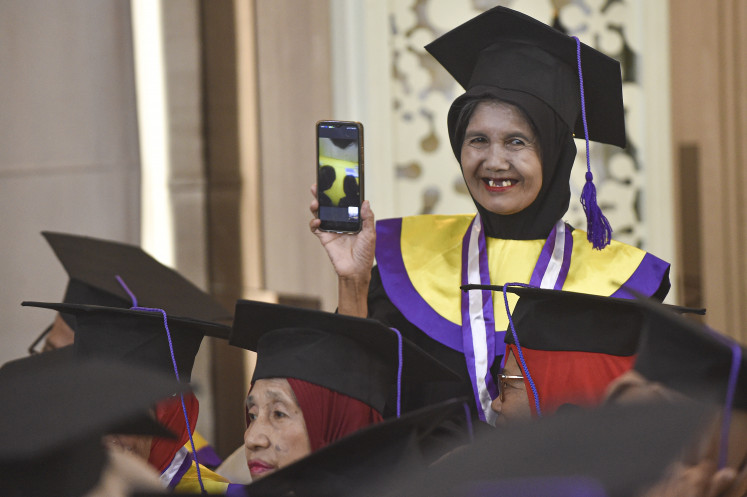Popular Reads
Top Results
Can't find what you're looking for?
View all search resultsPopular Reads
Top Results
Can't find what you're looking for?
View all search results‘Pesta Rakyat’ spotlights human capital development in driving innovation-driven economy
Change text size
Gift Premium Articles
to Anyone
M
ajor educational sessions at Pesta Rakyat untuk Indonesia 2025 emphasized the crucial role of human capital development in driving progress, not only for companies but also for the nation, while underscoring the need to continuously cultivate creativity- and innovation-driven business strategies.
The two-day event featured several Bincang Karya (Leadership Talks) sessions, where experts, professionals and business leaders shared insights, experiences, testimonies and practical tips on entrepreneurship.
The sessions, held at the Smesco Building on Aug. 22–23, were attended primarily by young entrepreneurs and university students.
During the event, PT HM Sampoerna (Sampoerna) president director Ivan Cahyadi took part in a Leadership Talks session themed “Cultivating values, nurturing creativity and picking innovations”, where he was interviewed by Gita Wiryawan, executive producer of the popular podcast Endgame and former trade minister.
Founded 112 years ago, Sampoerna stands as an enduring example of how creativity and innovation can drive growth, guided by its Three-Hand Philosophy, which includes a commitment to innovating for the benefit of its consumers.
Ivan explained that Pesta Rakyat untuk Indonesia was initiated out of a shared aspiration to see Indonesia move forward, whether under the banner of Indonesia Emas (Golden Indonesia) or any other vision. At the core of this ambition, he emphasized, lies the need to prioritize human capital development.
He stressed that by operating in the right way, Sampoerna can contribute meaningfully to this goal. “For example, we can help increase the number of employees who attain a bachelor’s degree [sarjana],” he said, pointing to the relatively low percentage of Indonesian workers who currently hold such qualifications.
Ivan noted that while Sampoerna employs around 90,000 people, not all of them have a bachelor’s degree. However, by providing the right working environment and training opportunities, many employees have been able to pursue higher education and earn their sarjana.
Moreover, with stable and sufficient income, employees are also able to support their children’s education. This, Ivan explained, creates a multiplier effect that extends beyond the company to the broader society.
When it comes to becoming an advanced country, Ivan noted that Indonesia has its own unique way of progress, one that preserves a human touch. Advancement, he emphasized, should not be achieved at the expense of social costs. “Yes, we need advancement and efficiency. But at the same time, we should not lose the human touch,” he said.
When asked whether Indonesia should invest more in science, technology, engineering and mathematics (STEM) to boost economic growth, he agreed that every party, including companies, must contribute to the advancement of STEM.
He noted that Philip Morris International (PMI), Sampoerna’s parent company, has invested around US$300 million in building smoke-free product production facility and a state-of-the-art laboratory in Indonesia. The facilities involve 200 Indonesian researchers.
Recalling another initiative, he mentioned that when the idea of Sampoerna-assisted grocery shops, Sampoerna Retail Community (SRC) was first introduced, “we had no idea it would grow this big. Today, SRC have more than 250,000 grocery shops nationwide.”
He emphasized that if every stakeholder invests in STEM, the collective impact would be remarkable. With Sampoerna alone engaging 200 scientists & experts, the potential results could be transformative.
Touching upon leadership, Ivan said, “Leadership is when you realize it is no longer about you, it’s about others.”
He explained that this means a leader must respect their team members, each of whom brings unique expertise that can contribute to solving problems.
As a company leader, Ivan emphasized that integrity is the foremost qualification when recruiting new employees. “I always remind my team that the top priority in hiring is integrity, followed by a strong drive and competence,” he said.
“Competence without integrity can harm the company, while competence itself can always be developed through learning and training,” he added.
In response to a question about how to build a work culture that drives productivity, given that Indonesia’s per-employee productivity per year remains lower than in developed countries, he explained that there must be “locomotives” that inspire, influence and drive others forward. For instance, in the United States, certain universities serve as economic locomotives.
“In Sampoerna’s context, we focus on developing employee capabilities and skills across the entire supply chain through programs such as Sampoerna Karya Bangsa and the Sampoerna Entrepreneurship Training Center [SETC]. These initiatives allow us to share knowledge with those eager to grow, becoming a catalyst for broader development,” he said.
New mindset
(Courtesy of HM Sampoerna)Meanwhile, Deputy Higher Education, Science and Technology Minister Stella Christie speaking at the Leadership Talks session themed “Grounded in logic and skyrocketing in imagination,” highlighted the government’s policies and strategies to position research as a new driver of national economic growth.
She shared that over the past 10 months, she had visited 17 provinces across Sumatra, Java, Kalimantan, Sulawesi and Papua, meeting with researchers from 34 universities to explore how local research could contribute to boosting regional economies.
To encourage research that supports economic development, the government is taking several strategic steps, including providing incentives for researchers and fostering collaboration with industry players for mutual benefit.
According to Stella, Indonesian universities are expected to adopt a new mindset in which research-based innovation becomes a driver of economic growth. By doing so, universities can produce a new generation of graduates with a strong research orientation, equipped to build innovation-driven businesses.
She emphasized that Indonesia’s abundant natural resources present vast opportunities for exploration by its talented citizens. For this reason, it is crucial to foster a competitive and inclusive ecosystem within universities, one that empowers lecturers and students to actively engage in research.
As examples, she pointed to nilam fish, tuna skeleton waste and seaweed, highlighting how effective research and innovation are essential to transforming such abundant resources into high-value products with significant economic potential.
The global seaweed market is valued at US$2 billion. Despite being the world’s largest producer, Indonesia has yet to capture a significant share due to limited research and underdeveloped processing. Most of its seaweed is still exported in raw form rather than being processed into higher-value products.
To address this, efforts are underway to develop the right technology for converting raw seaweed into dried and processed resources.
Highlighting the vast potential of research-based tropical seaweed, she explained that it could be transformed into sustainable aviation fuel. Indonesia alone could supply 10 percent of the targeted 4 billion liters, which would create new job opportunities. However, the main challenge lies in developing technology that can reduce production costs.
She added that the government is working with the Indonesian Employers Association (Apindo), universities and industries to build a research-based economic ecosystem. “We will also seek collaboration with overseas universities, including UC Berkeley and the Beijing Genomics Institute, for this purpose,” she said.
She further noted that Indonesia could establish a global brand, Indonesian Technology, a brand that showcases the nation’s original capabilities, such as technologies for processing essential oils (atsiri), seaweed and food. All of these are rooted in local research, she emphasized, and have the potential to drive growth.
Through a recorded video, Gresi, one of Sampoerna’s managers, warmly greeted Ibu Stella and expressed her appreciation for Stella’s consistent dedication to education. She then shared her career journey. Recalling her early days, Gresi mentioned that she joined Sampoerna in 1994 as a senior high school graduate.
Fortunately, Sampoerna provided her with the opportunity to pursue higher education while working, which eventually enabled her to earn her sarjana in 2013. Since then, she has been entrusted with a managerial role and has dedicated 35 years of service to Sampoerna.

